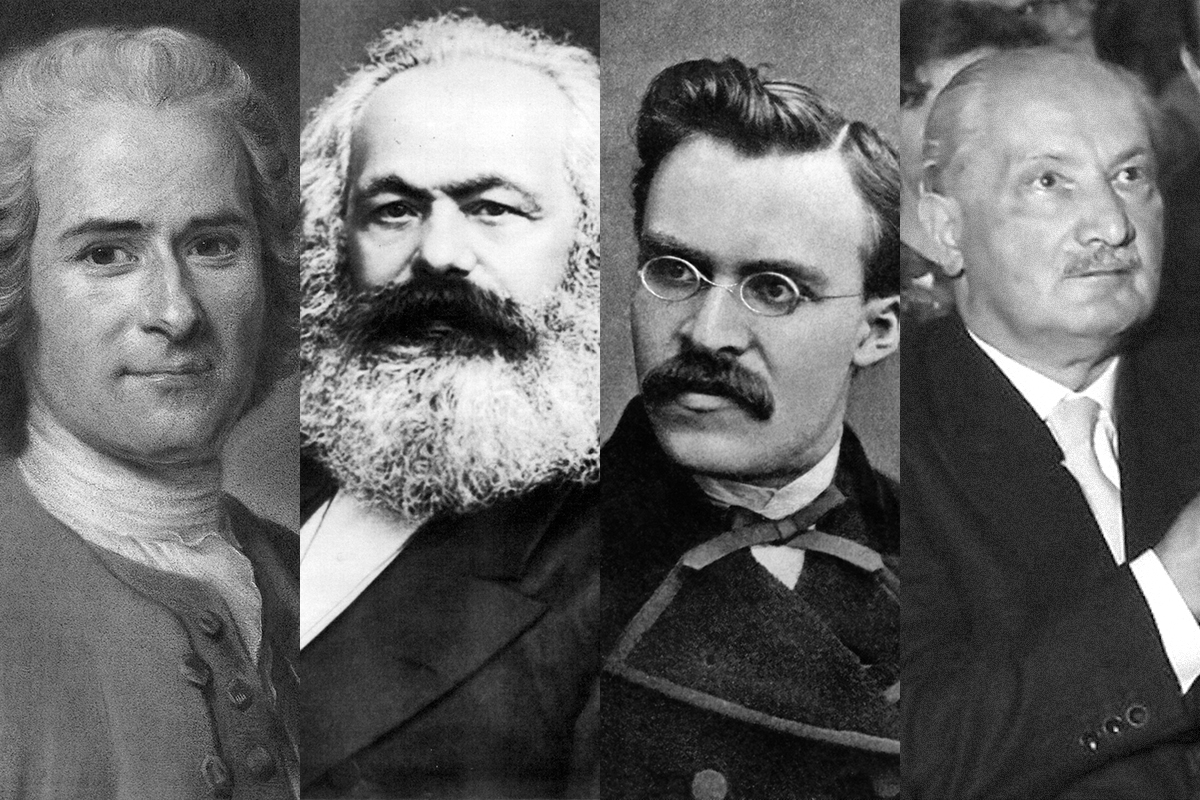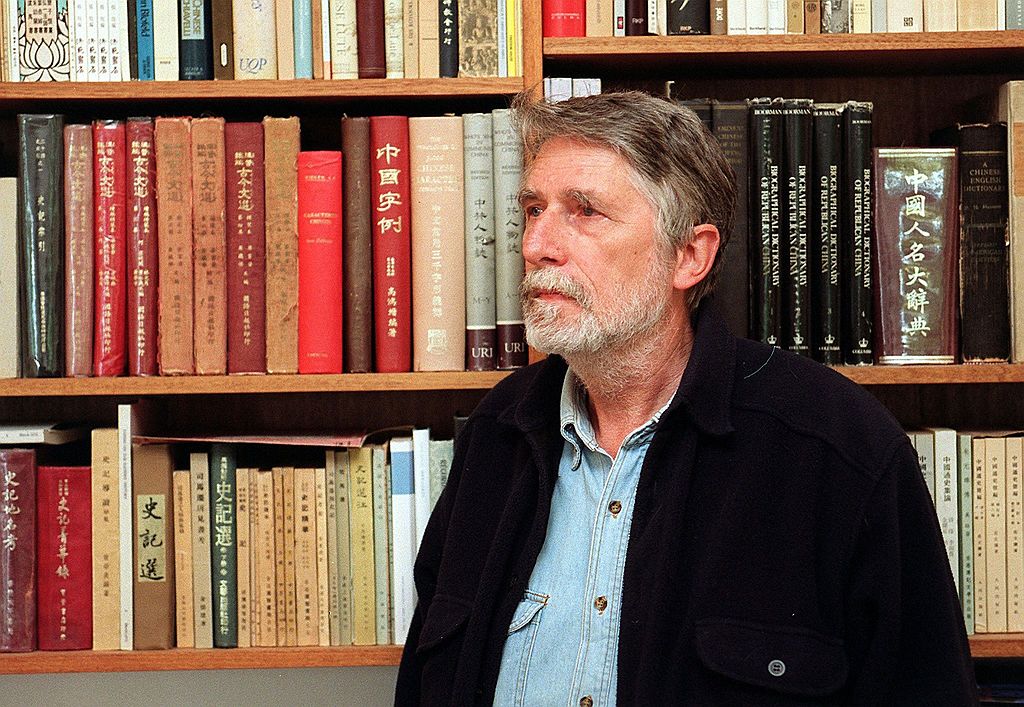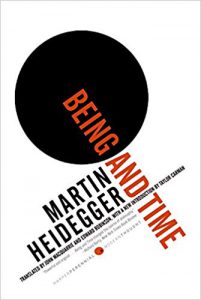recent
How Should We Read the Totalitarian Philosophers?
This is particularly true of Marx and (especially) Heidegger, who gave concrete support to parties and proposals that resulted in the deaths of millions of people.

This the first instalment in a series of essays by Matt McManus examining the work and legacies of the totalitarian philosophers.
How should one read and interpret authors whose work has clearly become associated—justly or not—with totalitarianism? In recent years, this debate has included figures like the Marxist historian Erik Hobsbawm, who has received scathing criticism for his soft approach to various communist regimes, and the literary theorist Paul de Man. However, here I will focus on the work of four philosophers whose work provided inspiration to totalitarianism and terror—Jean-Jacques Rousseau, Karl Marx, Friedrich Nietzsche, and Martin Heidegger.
It might seem disconcerting to imply there is a problem with reading such authors. After all, an intellectual work isn’t especially interesting unless it forces us to look critically at sides of ourselves and our societies we have been unwilling to examine—the darker undercurrents of politics and the human psyche. This may be especially true if we wish to combat totalitarian and authoritarian impulses successfully. Looking at those who inspired or supported these movements can give us a better understanding of their appeal. Hannah Arendt remains one of the most probing and articulate analysts of twentieth century totalitarianism, but she never gave in to a prudish dismissal of its intellectual inspirations. This gives her still controversial analyses a considerable depth often lacking in comparable authors; the Origins of Totalitarianism would be a lesser work without her Heideggerian sensitivity to the dangers of modern technocracy and inauthenticity.
In liberal democratic societies, we purport to place a high value on reading and combating even the most pernicious writings. These liberal virtues were perhaps best articulated by J.S Mill in his classic work, On Liberty. Mill convincingly argues that being exposed to ideas which challenge and disturb us can be exceptionally helpful. Beyond the dangers to individual rights in allowing public opinion or government officials to regulate what individuals can be exposed to, society benefits from exposure to provocative ideas in a number of ways.
First, an idea, while unpleasant, may well be correct or true, in which case we gain insight by being exposed to it. And even if it is only partially true, it can help us reach a more complete understanding of the whole truth. Second, even if the idea is simply wrong, we benefit from hearing it and having to think through why it is wrong. This connects to the third point, which is that even true or useful ideas need to be contested and re-evaluated if they are to remain fresh and avoid calcifying into rigid dogmas. Exposure to what Mill calls the “marketplace of ideas” can help us develop a better understanding of the world, often because we have been challenged by those who think differently. As Mill artfully put it:
He who knows only his own side of the case, knows little of that. His reasons may be good, and no one may have been able to refute them. But if he is equally unable to refute the reasons on the opposite side; if he does not so much as know what they are, he has no ground for preferring either opinion.
Of course, despite these forceful arguments, both Mill and the liberal democratic societies he inspired place restrictions on the expression of certain kinds of ideas. These run the gamut from laws against fraud and libel, to restrictions on child pornography and some other salacious materials. In some circumstances, liberal societies even permit state restrictions on forms of political expression. And while notably few books are banned outright (we have come a long way since Ulysses was prohibited due to its abstract depictions of sexuality) there are live discussions about whether or not one can praise or even discuss certain texts and still be acting morally.

For many, Rousseau remains a corrosive influence and an entry point to proto-authoritarian sentiments. Jordan Peterson and Paul Kengor have been extremely critical of anyone presenting the works of Marx as anything but proto-totalitarian and dangerous, given the slaughter subsequently carried our in his name. Early in the twentieth century Nietzsche was a black sheep in respectable circles because he was considered the official philosopher of Nazism. Martin Heidegger was actually a member of the Nazi party, and yet some still consider him to have been the greatest thinker of the twentieth century. Unfortunately for Heidegger, the recent publications of his Black Notebooks have exposed new associations between his thinking and antisemitism, reigniting the debate over whether it is still ethical to invoke him. So, while one can go into any college bookstore and find a copy of The Communist Manifesto or Being and Time, whether their ideas should stigmatize those who read and admire them remains a difficult question.
The Politics of the Totalitarian Philosophers
None of the authors discussed above are liberals in any sense. They had little patience for liberal rights and democracy, which they considered, at best, a waystation to a higher form of society, and, at worst, vulgar and degenerate. And certainly none of them would be surprised at the controversy that continues to surround their writings. Rousseau was a polemicist, famed for being difficult to get along with. Marx and Nietzsche were often bitingly satirical and deliberately aimed to provoke their opponents. Martin Heidegger—the philosopher without humor, par excellence—was more stately in his style but likewise published trenchant polemics attacking almost every established way of thinking. So, none of these men can be accused of writing boring books (well, maybe in parts). But can we justify reading any of them given the atrocities with which they have been associated, rightly or wrongly? Here we have to be very careful in distinguishing between the intended effect of a piece or writing, its actual effect, and the author’s own behavior.

Rousseau is one of the most mercurial figures in the history of Western political thought. He has been hailed as both the father of Romantic individualism, to the original totalitarian. Reading him is often frustrating and fascinating, as one encounters an endless series of brilliant observations, horrifying irresponsibility, and apparent contradictions. As a result, it can be difficult to identify the real Jean-Jacques Rousseau, and even his attempts at personal candor were mixed. At points, his writings seem to imply that the contemporary world is insufficiently individualistic and too beholden to mass opinion and commercial crassness. His Discourse on Inequality and Reveries of a Solitary Walker fall into this vein of romantic individualism. In many ways these were pioneering critiques of modernity’s limitations. At other points, such as in The Social Contract, his arguments for a “general will” which is both ontologically and morally superior to the aggregate will of all individuals does indeed assume the quasi-totalitarian implications identified by Isaiah Berlin, among others. It is difficult to know what he might have thought of the Jacobin revolutionaries his works inspired, though no doubt he would have found some way to aggravate them in the long run. Whether he genuinely supported terror seems to depend a great deal on which iteration of Rousseau one reads; the romantic individualist or the totalizing theorist of the general will.

Marx intended to expose the inner workings of a socio-historical system called capitalism, which he argued was exploitative and self-contradictory. A careful parsing of his work reveals that he judged capitalism to be riven by such serious dialectical contradictions that it would ultimately give way to a higher form of society in which private property would be eliminated. Of course, this was never actually the effect of Marx’s work. His predictions as to how the communist revolution would come about tended to be wrong, and the totalitarian societies erected in his name bore little resemblance to the utopian sketches (and that was all they were) offered in the Manifesto and the Critique of the Gotha Program. In his own behavior, Marx was an agitator and organizer, but never actually carried out any of the infamous acts with which his name has become associated. Nonetheless, the movements inspired by his writings were often responsible for the most appalling atrocities, so much so that for many Marx’s name borders on a curse.

Nietzsche’s works were clearly intended to criticize Judeo-Christian values and the liberal democratic societies that he described as springing from the ashes of religious civilization. He repeatedly criticized political moderates, mocked liberals, socialists, democrats, and the like. And certainly the totalizing quality of his work and its sheer intellectual brilliance probably made it inevitable that different groups would find different emphases within it. The Nazis drew upon Will To Power, the post-humous publication of which was organized by Elizabeth Förster Nietzsche (a Nazi supporter) to try and paint her late brother as a proto-fascist. There are certainly irresponsible passages within Nietzsche that could support such an interpretation, such as when he mocks feelings of pity and fetishizes strength and will. But a closer look at his life and philosophy show that he also detested nationalism, particularly when based on ethnicity, considering it the temptation of banal individuals. Had he lived, he would almost certainly have been aghast to see his writings associated with the Nazi movement, though we will never know if this would have inspired greater caution in his writings.

Heidegger’s situation is considerably different to either Marx or Nietzsche’s. Marx never lived to see the Bolsheviks and the Maoists transform his work, as Lenin did when he called for the organization of a vanguard party to seize control of the state. Nietzsche went insane long before the Nazis came to power, and might well have emerged as one of their wittier critics. But Heidegger joined the Nazi party and leant his already considerable intellectual reputation to the movement. At the time they seized power, he had recently published Being and Time, in which he presented an entirely new way of thinking about human existence. His account of human existence in Being and Time and other works is so profound and rich that it is difficult to think of the world in the same way after reading it. This is what makes his writings and behavior through the 1930s and ’40s so perplexing and infuriating. In his published writings such as What is Metaphysics? and speeches such as his rectoral address, he condemned liberalism and communism as “metaphysically the same” and called upon Germany to assume its unique destiny in bringing about new ways of being in the world. When presented with evidence of the death camps, Heidegger hardly had anything to say, and when he bothered to speak up, it was largely to equivocate. In his most recently published Black Notebooks, he expressed a host of antisemitic views and directly associated them with his thinking. That he was nonetheless a brilliant philosopher hardly seems sufficient to forgive his living and active support of such a monstrous regime. Like Carl Schmitt, another highly intelligent Nazi party member, it is hard to read a page of his work without the tragic feeling that a great mind has turned a very dark corner.
Conclusion
He who thinks great thoughts often makes great errors
~Martin Heidegger
Rousseau, Marx, Nietzsche, and Heidegger are four figures who embody what it means to be a dangerous thinker. Each of them offers remarkable ways of looking at the world, but are burdened by a historical legacy often associated with violence and wickedness. This is particularly true of Marx and (especially) Heidegger, who gave concrete support to parties and proposals that resulted in the deaths of millions of people. Is it possible to morally justify treating their ideas with sympathy and intellectual charity, given our knowledge of this legacy?
I think that we can, although it makes reading and interpreting them a more complex task. Following Mill, I would argue that each of these authors presents important truths about the world we now inhabit that can compel us to reflect more deeply on our own dogmatically held opinions. Rousseau taught us a great deal about how the crass pursuit of naked self-interest can lead to a deep sense of inauthenticity. Marx’s analysis of how capitalism is a revolutionary mode of production which upends tradition societies and their values was a brilliant insight. It can tell us a great deal about how our societies have become increasingly fragmented and pluralistic. Nietzsche’s psychological account of resentment remains the most damning critique of the politics of victimhood to this day, and his genealogical look at the history of moral truths was pioneering. Heidegger’s interpretation of human existence in the world can be separated from his more nefarious political commitments, and provoke deep reflection on some of the rationalistic dogmas all too common today. Indeed, I often think a deeper look at Heideggerian computing in the manner of Herbert Drefyus would do away with certain popular but reductionist accounts of human consciousness and behavior. In each of these examples, it is a matter of separating the wheat from the chaff.
We have less to fear from these authors than we do from those determined to interpret them in a malicious or dangerous manner. In any political context there will always be those who will turn to such authors for inspiration or justification for terrible things. Often, as with Richard Spencer’s invocation of pseudo-Nietzschian tropes, these are based on taking the most extreme and vulgar interpretations of an author’s work to justify positions they themselves would probably have never supported. In other situations, we can see figures taking inspiration from the very worst ideas an author put forward, at the expense of the very best, such as those who lift quotes from Marx about the glories of revolutionary violence, and use them to justify totalitarian terror. In those cases we have no choice but to acknowledge the author was partially at fault, while condemning those who take inspiration from what is most valueless in their writing.
We needn’t moralize about dangerous authors, and immediately condemn those who find something of value in their work. Taking our cue from Mill, we should recognize that part of the attraction of these authors it that they say many things that seem disturbing, and at times reprehensible, but which nonetheless may contain a considerable amount of truth. Finding those truths and making use of them is one of the virtues of careful and engaged scholarship.






